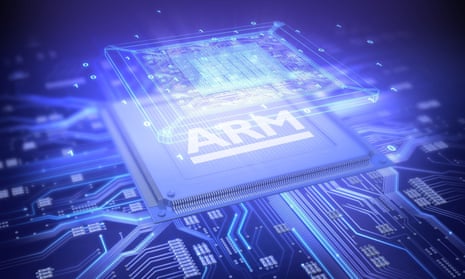Arm, a prominent chip IP company, has become a leading force in the market for chip architecture, with its technology influencing nearly every smartphone and expanding into PC, server, and automotive spaces. The company, which went public in an IPO valuing it above $54 billion, has seen robust revenue growth, primarily driven by licenses for its chip architecture and royalties collected on every chip shipped with its technology.

Arm's clientele includes major tech and chip companies such as Apple, Nvidia, Google, Microsoft, Amazon, Samsung, Intel, and Taiwan Semiconductor Manufacturing Company. Despite facing challenges such as regulatory obstacles and a slump in smartphone sales, Arm continues to advance in diverse markets, including the development of AI-based chips and expanding into server and PC processors.
Founded in 1990, Arm initially gained traction through partnerships with Apple and Texas Instruments, which marked its foray into the mobile phone market. Since then, the company has grown rapidly, attracting significant investments and acquisitions, including SoftBank's acquisition in 2016. Arm's technological advancements and patent portfolio have allowed it to diversify into emerging markets, particularly in AI and high-performance computing. Notably, Arm's Neoverse line has played a critical role in enabling breakthroughs in AI and cloud computing, as evidenced by collaborations with Nvidia.
While Arm has faced challenges, including regulatory hurdles and the emergence of competitors like RISC-V, it remains a dominant force in the industry. Its successful partnerships with leading companies like Apple in the development of custom processors for Mac computers have showcased its ability to drive innovation and disrupt traditional markets. Arm's expansion into automotive and the growth of its server chips further demonstrate its resilience and adaptability in an ever-evolving industry.
Amidst geopolitical uncertainties and supply chain issues, Arm has navigated export controls and geopolitical tensions, particularly in its business operations in China, where it has established an independent entity, Arm China, to address specific market needs. The company remains optimistic about its future growth potential, focusing on cultivating talent and addressing labor shortages in the semiconductor industry.
Arm's impact on the chip industry is far-reaching, with its innovative chip architecture powering the devices and technologies of major tech companies. Despite challenges and competition, Arm's continued focus on diversification, technological advancements, and strategic partnerships positions it as a key player in the evolving landscape of semiconductor design and innovation.







